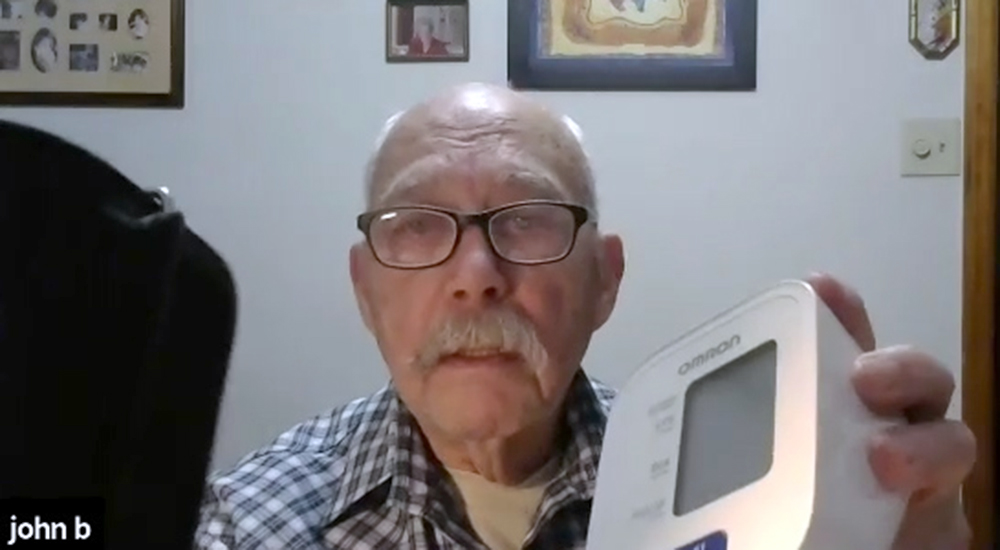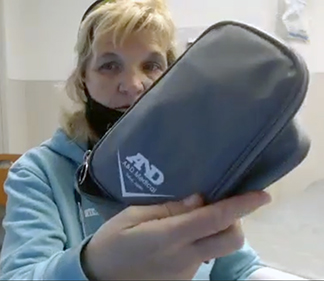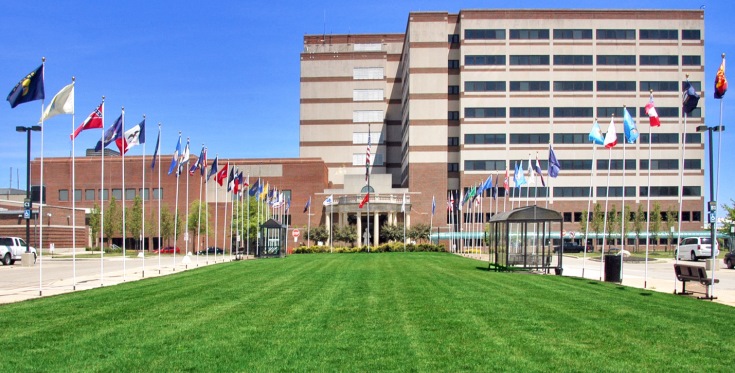Veteran Ronald Bordenaro, 89, has five kids, 13 grandkids, 10 great-grandkids and two more on the way. He lives in South Holland, Illinois, with his wife Suzanne and their son John. Thanks to videoconferencing, he was able to see his entire family for Thanksgiving.
Similarly, many of Bordenaro’s health care visits have taken place through videoconferencing. He was diagnosed with high blood pressure a few years ago and VA’s telehealth program has enabled him to continue his VA care at home. He takes his own blood pressure and shares his measurements with his VA care team during secure video visits through the VA Video Connect app.
Bordenaro (pictured above) lives about 40 miles from the Edward Hines, Jr. VA Hospital in Hines, Illinois, where Kitty Thomas serves as a nurse manager for the hospital’s patient-aligned care team (PACT) primary care clinic. Her clinic recently began participating in the innovative video blood pressure pilot program that makes virtual visits possible for Bordenaro.
“Best appointment I’ve ever had”
Thomas saw this pilot program as an opportunity to embrace virtual visits, as they have become more common due to COVID-19. She decided to try a video appointment on her lunch break one day. She is not a Veteran but her primary care physician also offers virtual care.
“It was the best appointment I’ve ever had,” she said. “It made me really excited to get involved with virtual care for Veterans.”
She called on VA staff nurse Loretta Gorecki to champion the video blood pressure program among the other registered nurses and licensed practical nurses in the clinic.
Gorecki and the PACT team equipped Veterans with blood pressure cuffs and instructed them on how to use them at home during a VA Video Connect appointment.
Blood pressure checks and video visits go hand in hand. “When you’re at home, you’re a little bit more relaxed than when you come to the doctor’s office,” said Thomas. “So we get a better reading.”
She compared this to “white coat syndrome,” when a patient’s blood pressure increases because they’re in a clinical setting.
Able to check correct use of cuffs
Thomas also noted that video appointments enable nurses to see if Veterans are using the blood pressure cuffs correctly.
Barbara Pfingston, a nurse on Thomas’ team who sees Veterans like Bordenaro for video blood pressure visits, said people have reacted positively to virtual care. “They’re happy to see my face. With the pandemic, everyone has been under so much stress. The video visits allow us to interact with Veterans so they don’t feel alone.”
To introduce a Veteran to virtual visits, Pfingston calls them before the visit. She makes sure they have received the link to their VA Video Connect appointment and helps them troubleshoot any issues.
Thomas said using VA Video Connect is as easy as calling a child or grandchild or playing a video game, and Veterans have picked it up quite easily.
Recommend at home care when possible
The PACT clinic is still open for face-to-face appointments, but staff members encourage Veterans to stay home when they can complete a task over video.
“I think everyone should experience a virtual visit,” said Thomas. “If you can see it from both angles, that of the Veteran and provider, you can be a better advocate for the technology among other VA practitioners.”
Bordenaro said he’s fortunate to be both mobile and capable of taking his blood pressure at 89. But he’s also glad to know that if he loses mobility later, he can receive VA virtual care at home.
“Video connectivity is solving a lot of problems,” he said.
For more information on VA Video Connect and other VA telehealth apps, visit the VA App Store.
Gwen McMillian is a communications specialist with VA’s Office of Connected Care.
Topics in this story
More Stories
Larry Trujillo lost 44 pounds and improved his relationship with food during the 90-day TeleMOVE! telehealth program.
The Dayton VA Medical Center released its March 2025 Good News Report, spotlighting compassionate care, special recognitions, and life moments shared by Veterans and staff.
Each year, I return to honor my old corpsman's memory and reflect on serving together.







I have been part of the VA Telehealth program for over two years. It is wonderful and very helpful. I can measure BP, Blood Sugar and weight and it electronically sends it to my telehealth nurse and she sends it alog to my Cardiologist, Arrythmia, and cancer docs.
What a wonderful program
Greg Tn
Are all VA Hospitals and or clinics providing BP Cuffs to vets who are being treated to High BP.
Stephen Brady
Katy, Texas
The clinic where I am serviced, Wm C. Tallent Veterans’ Clinic in Knoxville TN has provided me with a BP Cuff as far back as 8 years … and replacing it when necessary. I really don’t consider that I’m a special case, so I would think they do the same for all vets who are treated for HTN.